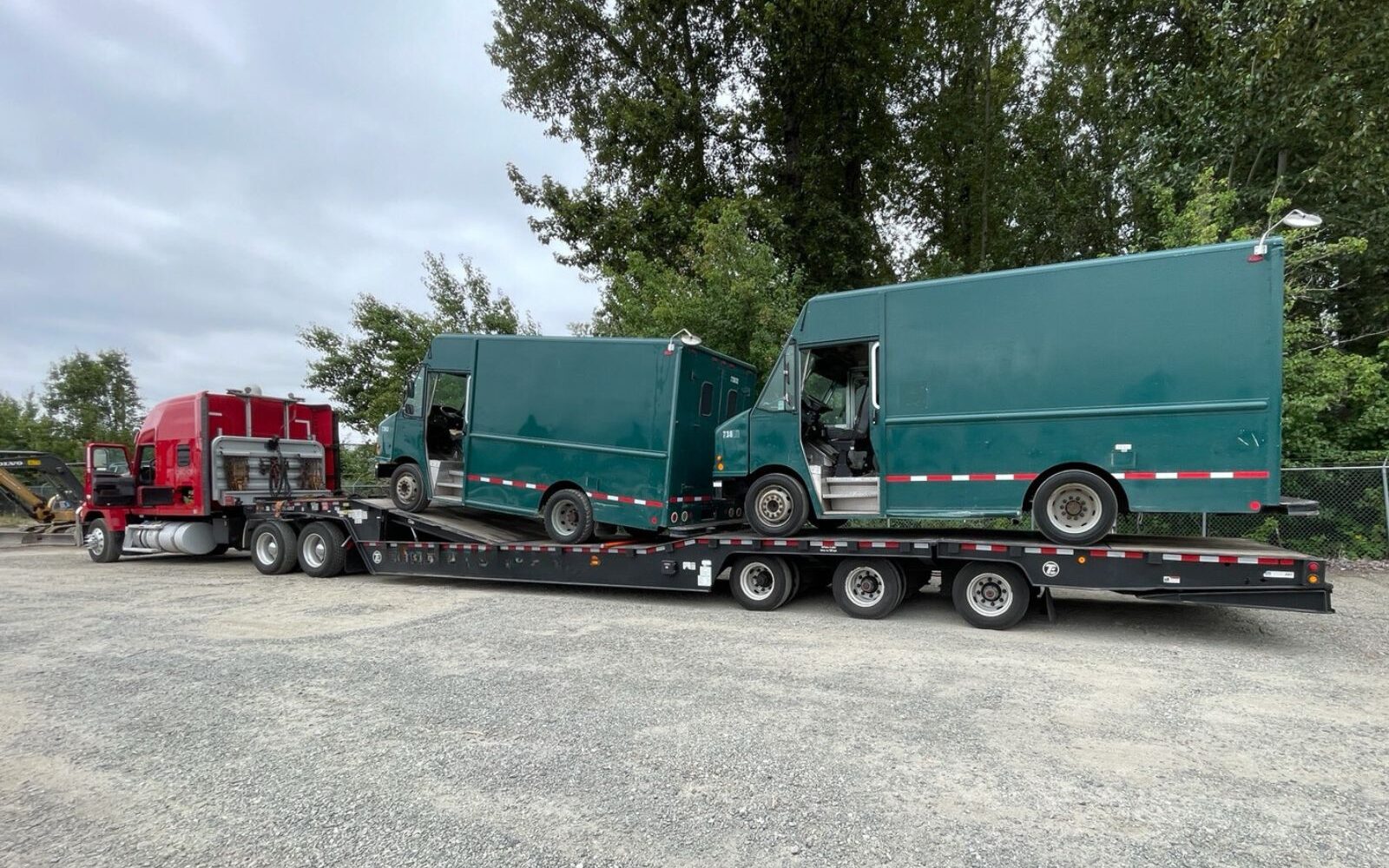Heavy Haul Transport
Heavy Vehicle Shipping · Commercial Truck Transport
Reliable transport for overweight loads
Heavy haul vehicles are used to transport oversized or overweight loads that cannot be transported by standard trucks. These vehicles are designed to carry loads that exceed the weight and size limits set by federal regulations.
Heavy haul transport requires specialized equipment and experienced drivers who are familiar with the regulations and safety precautions that need to be taken. The equipment used in heavy haul transportation is designed to handle the weight and size of the loads being transported. This includes specialized trailers, trucks, and cranes that are capable of lifting and moving loads that weigh several tons.
Beeline Auto Transport is proud to offer heavy haul vehicle shipping services to our clients. We understand that transporting heavy vehicles can be a complicated and stressful process, but with our expertise and experience, we are committed to making it as smooth and hassle-free as possible.
It’s important to assess the load carefully and determine determine its weight, size, and dimensions.
We will use this information is used to plan the route and choose the appropriate equipment needed to transport the load safely. Beeline Auto Transport takes care of obtaining the necessary permits and comply with state and federal regulations, which can vary depending on the size and weight of the load.
Once the planning is complete, we will load the equipment onto the specialized trailers and secure it using chains and other safety devices. The load is then transported to its final destination, which can be a factory, construction site, or other location.
What types of vehicles are considered heavy haul?

Heavy vehicle permits and regulations
In the United States, heavy haul vehicles are subject to strict regulations and safety requirements. These regulations are in place to ensure that heavy haul vehicles are operated safely and that the loads they carry do not pose a danger to other motorists. Heavy haul vehicles must be equipped with specialized equipment such as oversize load signs, warning lights, and escort vehicles.

The transportation of heavy haul vehicles is a complex process that requires careful planning and coordination. Beeline Auto Transport can obtain the necessary permits and approvals from state and local authorities before the transportation process can begin. Additionally, our transport professionals carefully plan the transportation route to ensure that the load can be safely transported without causing damage to roads, bridges, or other infrastructure.
Our team of professionals has the necessary training and equipment to handle heavy haul vehicle shipping, whether it is a construction vehicle or a large truck. We take pride in our ability to provide our clients with personalized service that meets their unique needs and requirements.
| Max Weight | 48,000 lbs |
| Max Length | 53 ft |
| Max Width | 8.5 ft |
| Max Height | 8.5 ft |
| Max Weight | 48,000 lbs |
| Max Length | 53 ft (up to 80ft) |
| Max Width | 8.5 ft |
| Max Height | 11 ft |
| Max Weight | 40,000 lbs with tandem axle, more with extra axles |
| Max Length | 24 ft (up to 80ft) |
| Max Width | 8.5 ft |
| Max Freight Height | 11.6 ft |
| Max Weight | 40,000 lbs with tandem axle, more with extra axles |
| Well Length | 29 ft |
| Well Width | 8.5 ft |
| Max Freight Height | 11.6 ft |
| Max Weight | 15,000 lbs |
| Max Length | 40 ft |
| Max Width | 8.5 ft |
| Max Freight Height | 10 ft |

How much does heavy haul transport cost?
When it comes to heavy haul, the cost can vary based on a multitude of factors. Every vehicle and route is unique, which is why consulting with a transport specialist is crucial to get an accurate estimate.
While online vehicle shipping cost calculators can be convenient, they may not always provide an accurate representation of the final cost — This is especially true for heavy and oversized loads, which tend to be more unique.
It’s also important to be cautious of lowball prices, as they could potentially hide additional fees or lead to unexpected price increases after signing the contract.
By working closely with a transport expert, you can ensure a smooth and transparent vehicle shipping process without any surprises along the way.
| Type of vehicle | The shipping cost is influenced by the type of vehicle that you want to transport. Larger vehicles incur higher shipping costs because of their size and the fuel and labor needed. Due to their size, larger vehicles may also take up more space on transport trucks, leading to higher expenses. |
| Vehicle condition | The shipping process is impacted by the overall condition of your vehicle. Inoperable vehicles call for extra equipment and labor to ensure secure transportation. Vehicles unable to independently drive onto carriers will need specialized equipment such as a winch for loading and unloading. |
| Distance | The distance of the shipment is one of the main factors in calculating the cost of heavy haul transport. Longer distances typically result in higher costs because of the increased fuel and labor needed. |
| Type of carrier | The method of transport or type of carrier influences the overall cost. Towing a vehicle is typically more cost-effective than hauling. |
| Seasonal fluctuations | Seasonal variations greatly impact heavy haul transport costs. High demand during peak summer months can lead to price hikes. Conversely, lower demand in the off-season may result in reduced prices. However, adverse weather conditions such as heavy snow in winter can cause delays and increased expenses. |
| Fuel price | Fluctuations in fuel prices can directly impact the overall cost of transporting a vehicle. Higher fuel prices can result in increased shipping costs as carriers pass on these expenses to customers. On the other hand, lower fuel prices may lead to more competitive rates for heavy haul transport services. |
The cheapest way to Ship a heavy vehicle
So what is the best way to keep heavy haul transport cost to a minimum? If you keep a few things in mind, you can avoid unnecessary costs for shipping.
Opt for open transport (if the size and weight of your vehicle allows it): The standard and most economical way to ship vehicles in the industry.
Ensure your vehicle is operable: Carriers charge extra for handling inoperable vehicles, so make sure your vehicle runs and drives.
Plan ahead: Booking in advance helps avoid expedited or last-minute fees.
Keep your schedule flexible: A flexible schedule often leads to more budget-friendly quotes.
Consider low-season transportation: Shipping vehicles is usually cheaper during winter compared to summer.
Choose major city locations for pickup and delivery: If you live in a rural area, arranging for vehicle pickup and drop-off near a major city can be more cost-effective.
Transport multiple vehicles: Shipping more than one vehicle on the same truck can result in savings.
Inquire about discounts: Active military members, seasonal travelers, or repeat clients may be eligible for discounts.
Serving All 50 States
Including Hawaii and Alaska

Got more questions?
We can help.

